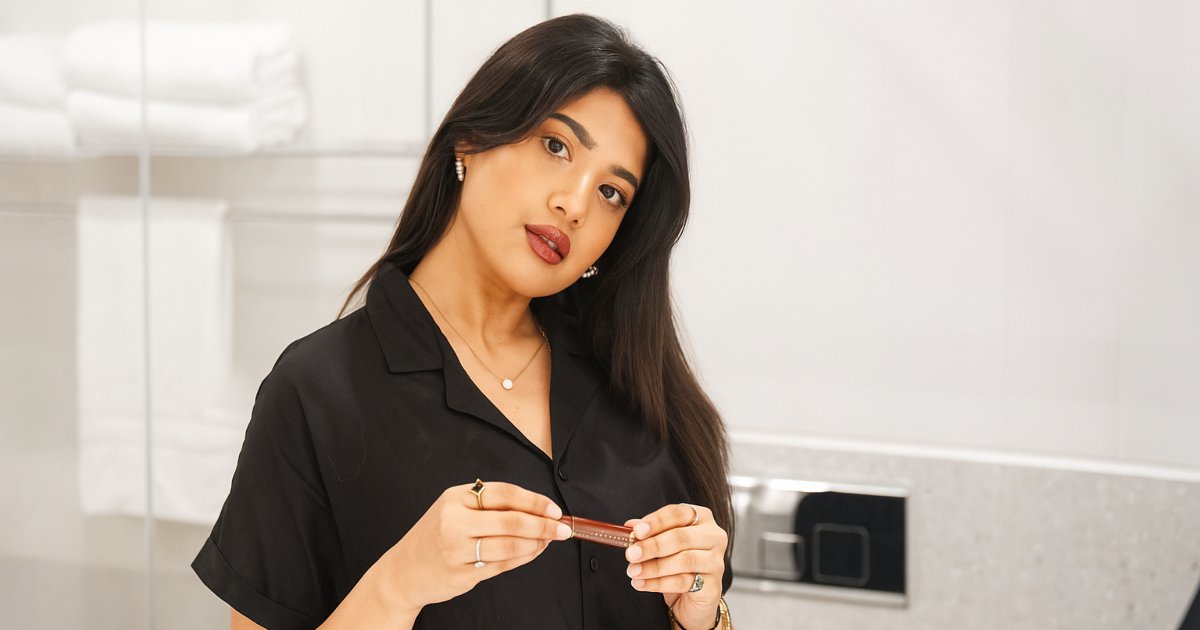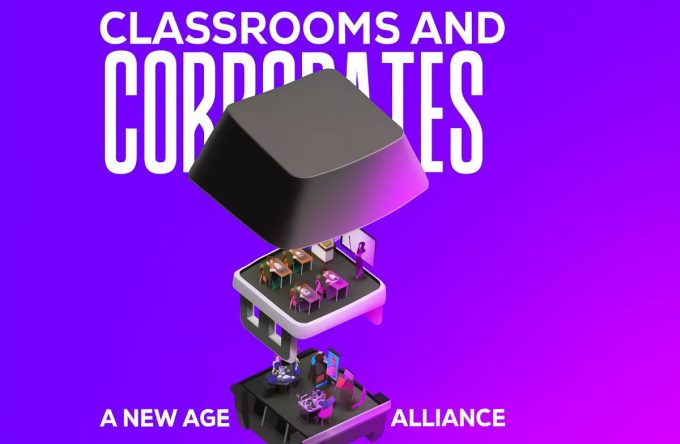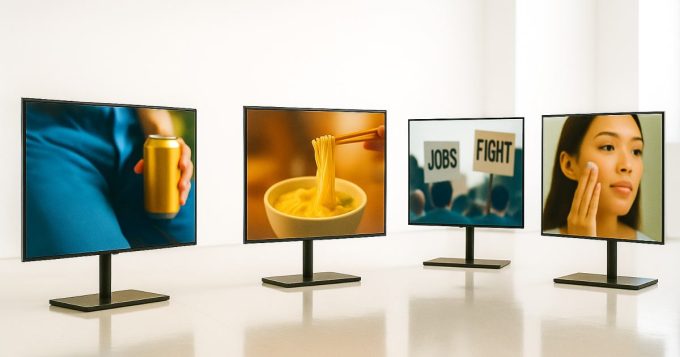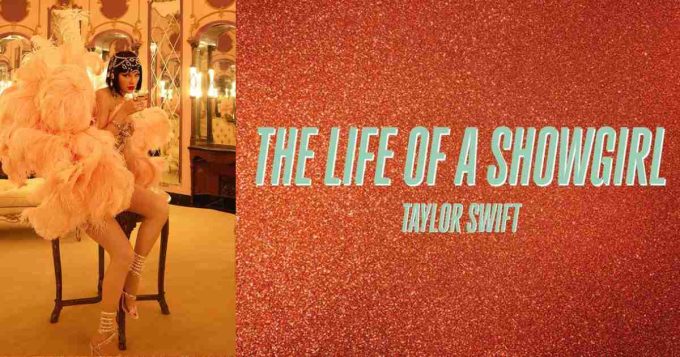Momina Munir with Synergyzer Magazine
Momina Munir started out like most of us; just a kid messing around with a camera. A teenager documenting school life turned into a full-fledged entrepreneur. Fast-forward a few years, and she’s built a digital empire, launched businesses, and still kept it real. So, what’s the story behind the screen?
Synergyzer: You took your first steps into the world of YouTube at a remarkably young age. How would you describe the twists, turns, and triumphs of your journey so far?
Momina Munir: My YouTube journey began in 2016. Although those early videos are now private, I was quite young and still figuring things out at the time. Initially, I focussed on makeup content, but in 2018, after discovering Irfan Junejo’s vlogs, I was inspired to document my school life.
It felt like a great way to create lasting memories for my friends and family to look back on. One of my school vlogs unexpectedly started gaining traction, and that’s when everything changed. Over the years, I’ve had the privilege of building a wonderful community, and I’m incredibly grateful for the support and engagement from my audience.
Synergyzer: Do you think influencers today are using social media platforms as a stepping stone to do bigger things?
Momina Munir: I absolutely agree that social media serves as a stepping stone for networking within the industry. It provides a platform to showcase one’s work and build connections, which can be incredibly valuable, especially in an industry as close-knit as Pakistani drama.
That said, having an online portfolio does help, but it doesn’t replace the audition process. At least in my experience, I’ve had to go through multiple auditions to earn my roles, just like any other actor.
Synergyzer: What’s the biggest misconception about being a content creator that people still believe?
Momina Munir: One of the biggest misconceptions about being a content creator is that it’s easy and effortless. Many assume that we just record a video, post it, and instantly gain views, but in reality, it requires a lot of planning, creativity, and consistency.
From scripting and filming to editing and engaging with the audience, every step takes time and effort. It’s not just about making content—it’s about understanding trends, managing collaborations, and constantly evolving to stay relevant. It’s a full-time job that demands dedication, just like any other profession.
Synergyzer: Can you walk us through your content creation process—from ideation to execution?
Momina Munir: My content creation process is quite organic—I don’t follow a strict formula. Ideas can come from anywhere, whether it’s a random thought, a trend I find interesting, or something my audience wants to see.
I usually note them down and let them sit for a bit until I feel inspired to execute them. When it comes to filming, I prefer to keep things natural and spontaneous rather than overly structured.
I shoot whenever I feel the vibe is right, and then comes the editing, which is where everything comes together. It’s a mix of intuition and creativity rather than a rigid process, and I think that’s what makes my content feel authentic.

Synergyzer: How do you deal with creative slumps, and what keeps you motivated to keep posting?
Momina Munir: Creative slumps are inevitable, and I’ve definitely experienced my fair share. When I feel burnt out, I take a step back rather than forcing content. I remind myself that creativity flows best when it’s not pressured.
Sometimes, that means taking a break, travelling, or simply living life without the camera; it helps me come back with fresh ideas. What keeps me motivated is my audience and the community I’ve built.
Knowing that my content resonates with people and brings them joy makes it all worth it. Plus, I remind myself why I started, because I genuinely enjoy creating, and that passion always finds its way back.
Synergyzer: What’s the most unexpected video or piece of content that went viral for you?
Momina Munir: The first video that went viral for me was about ‘School Life in Pakistan’. I honestly didn’t expect it to blow up, but it resonated with a lot of people who shared similar experiences.
I’ve never fully understood the formula behind virality, but I do believe that relatability plays a huge role. For me, the key has always been to consistently create content that feels authentic and connects with my audience on a personal level.
Synergyzer: Do you ever feel pressure to ‘perform’ or maintain a certain image online? If so, how do you navigate that?
Momina Munir: Every creator feels that pressure to some extent. There’s always an expectation to be entertaining, presentable, or even ‘perfect’ online. But I try not to let it dictate my content or who I am.
I remind myself that people connect with authenticity, not just a curated image. If I’m having an off day, I don’t force myself to create. I also set boundaries—what I share online is just a part of my life, not the whole picture. Staying true to myself helps me navigate that pressure without feeling overwhelmed.

Synergyzer: If you could give one piece of advice to young Pakistani creators entering the digital space today, what would it be?
Momina Munir: My biggest advice to young Pakistani creators is to stay consistent and authentic. The digital space is evolving fast, and while trends come and go, what truly makes you stand out is your originality.
Don’t just create content for the sake of going viral—focus on what you genuinely enjoy and what adds value to your audience. Also, be patient. Growth takes time, and success doesn’t happen overnight. Keep showing up, keep improving, and most importantly, have fun with it.
Synergyzer: How does your experience as a content creator help in marketing your food and makeup business compared to someone starting the same business?
Momina Munir: Being a content creator has given me a significant advantage in marketing both my food business, Noodle Woodle, and my makeup brand, Nyla Cosmetics, compared to someone starting from scratch.
With Noodle Woodle, my experience in content creation helped me generate buzz quickly. I already understood how to create engaging visuals, tell a compelling brand story, and leverage social media to attract customers. Instead of relying solely on traditional marketing, I used my platform to showcase the brand’s personality and connect with my audience directly.
For Nyla Cosmetics, the advantage is even greater because beauty content is something I’ve been creating for years. I know what consumers look for in a makeup brand, how to present products effectively, and how to engage with an audience that trusts my recommendations.
My existing community also played a key role in driving interest and early sales. Overall, having experience as a content creator makes it easier to navigate digital marketing, build brand awareness, and create a strong connection with customers, something that takes time for someone starting from zero.
Synergyzer: What was the biggest challenge in launching your beauty brand?
Momina Munir: Launching Nyla Cosmetics came with its fair share of challenges, but the biggest one was definitely breaking into an already saturated market. The beauty industry is highly competitive, with so many established brands, both local and international. Standing out and convincing consumers to try a new brand takes a lot of effort.
Beyond that, sourcing high-quality products that met my standards was another challenge. I wanted to ensure that everything—from formulation to packaging—was top-notch, while still being affordable. Branding was also crucial because, in such a crowded market, having a strong identity and clear messaging makes all the difference.
Despite these challenges, my experience as a content creator helped me position Nyla Cosmetics in a way that resonated with my audience. I focussed on transparency, quality, and storytelling, which helped build trust and excitement around the brand.

Synergyzer: Do you think Pakistan needs laws for influencer marketing to protect both brands and creators?
Momina Munir: Pakistan needs clearer regulations for influencer marketing to protect both brands and creators. Right now, the industry operates in a very informal way, which can lead to misunderstandings, delayed payments, or unrealistic expectations from both sides.
Having proper guidelines—whether it’s transparency in paid partnerships, fair contracts, or ethical advertising—would create a more professional and trustworthy ecosystem. It would also help new creators navigate the industry better and ensure that brands uphold their commitments. Regulation does not have to mean restriction; it just ensures fairness and accountability for everyone involved.










